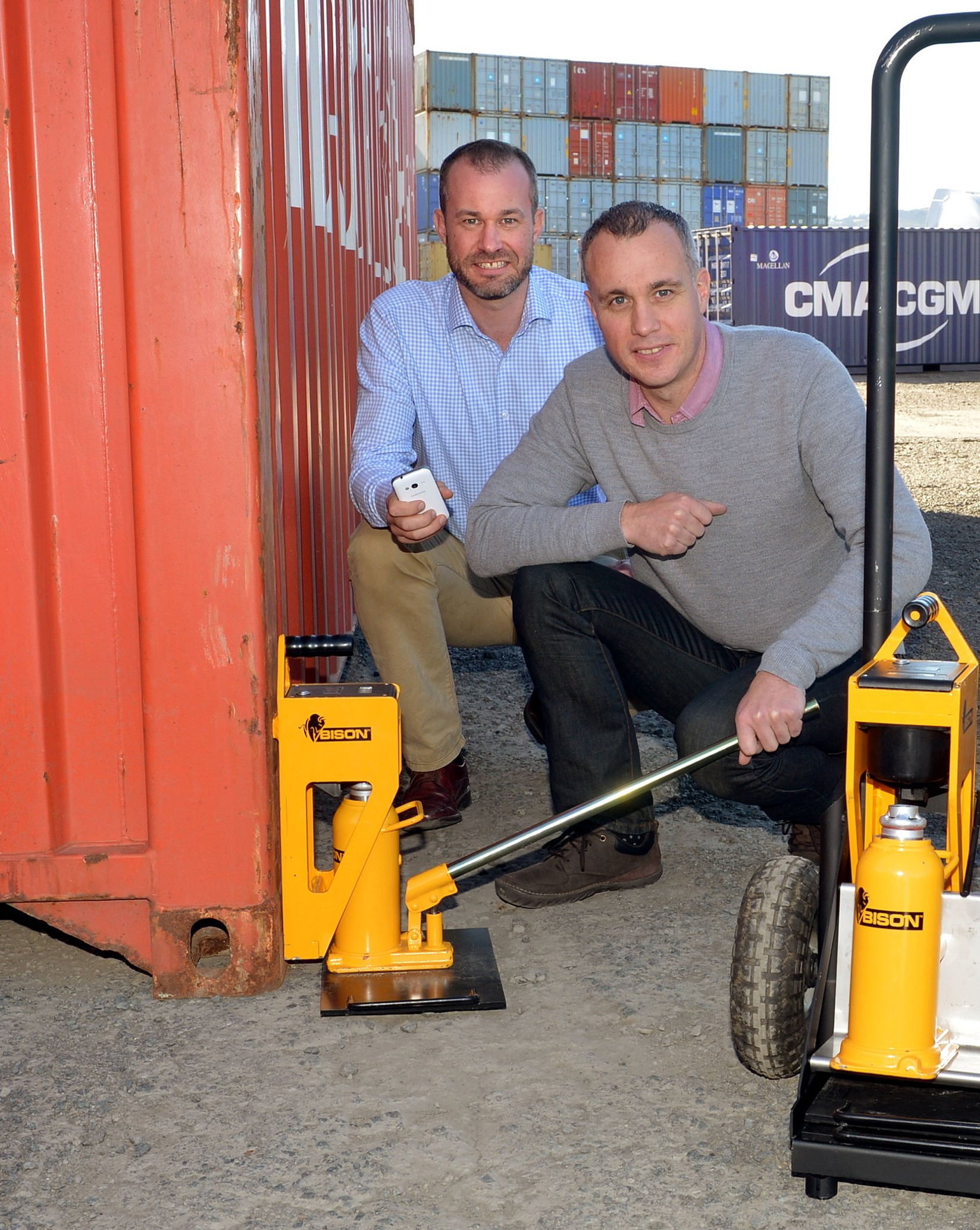By Glenn Baker.
In 2013, while jointly working on a container handling device, Dunedin-based brothers Greg Fahey and Dr Mark Fahey discovered new international container weighing laws on the horizon.
From 1 July 2016, shippers must ensure that the weight of every laden export container is verified using one of two weighing methods – weighing the entire packed and sealed container, or calculating the container’s gross weight by weighing the contents and adding the container’s tare weight.
The verified weight (known as Verified Gross Mass or VGM) must be given to the shipping line in time for preparation of the vessel stowage plan. Without it, the shipping line and terminal will not be allowed, by law, to load the container on board a vessel.
Anticipating that this would lead to a big demand for container weighing solutions, the Fahey brothers conceived their BISON weighing jacks and were surprised that no similar equipment was on the market.
“After filing patent claims, we picked the idea up again in late 2014,” says Greg, “raising seed capital so we could commit full time to developing and commercialising it.”
Greg is a former corporate lawyer, having worked previously with law firms and growth companies in New Zealand and the UK. As BISON's CEO, he’s responsible for the company's commercial affairs.
Mark is the technical genius and CTO. With a PhD and 20 years professional mechanical engineering experience, he leads the start-up's product development and production activities. “Our skill sets are proving complementary and have helped strike a balance between the technical and commercial demands of the business,” says Greg.
With a limited window of opportunity, the Faheys had to move fast, and it’s not all been plain sailing.
“We've encountered many challenges typical of start-up tech companies,” says Greg. “Over the last year we've worked through a pre-revenue, product development phase with a lean capital base. Converting a concept into a certified industrial weighing instrument and building a solid production and sales platform around that in a relatively short time, with limited resources, has been a big challenge. It's forced us to stay focused and work smart, which are all good values to carry through to the company's next phase.”
The old adage that everything takes twice as long as planned and costs three times as much as expected, still holds true, he says. “You have to plan for this.”
Greg says the new international rule was driven by concerns around safety and inefficiency in maritime transport due to shippers not accurately declaring container weights.
While the rule change has been driven by maritime authorities, mis-declared container weights cause safety hazards on the land side of the logistics chain as well, including for road and rail carriers and the general public.
“The new weighing rules present a major disruptive change for the shipping industry globally,” he explains. “Without a verified weight, containers simply won't be loaded onto ships. Shippers, carriers and terminals are all motivated to keep cargo flowing so there's now widespread interest in efficient ways to weigh containers.”
While shippers are obliged to verify container weights with certified equipment, there isn't a lot of certified equipment around to do the job, says Greg. “Weigh bridges are really the only alternative. However, weighbridges are in limited supply. They are big, permanent and expensive installations, and typically located away from the container pack point, which industry guidelines say is the best location for verifying container weights.
“Weighing jacks are unique in that they're accurate, can be certified and are portable; offering shippers a compliant and versatile tool for weighing containers in any location and before they enter the logistics chain.
“Our BISON jacks let the operator check the container's weight distribution, and they synch with a smartphone app, streamlining communication of the VGM.
“So the opportunity for Bison is really exciting. We have a unique compliance solution for a truly global market.”
Well supported
BISON has made serious headway with support from local suppliers, alpha customers, investor groups and Government agencies. The Faheys’ key development partners are also located in Dunedin and have brought world class engineering, electronics and software expertise to the company. Meanwhile NZTE has assisted with introductions overseas, and the start-up has benefited from Callaghan Innovation's R&D grant funding.
“We’ve built the company to date on a mix of sweat equity, external seed capital, grant funding and early sales,” says Greg. “To fund growth, we’re planning a second equity capital raising around May this year.”
Greg and Mark are especially grateful to the angel investor community which, they say, provide more than just capital.
“The experience on our board, the connections and pearls of wisdom brought by our shareholders have been immense,” says Greg. “We've really valued our association with Ice Angels and the Otago angel investor community and look forward to it continuing.”
Right now the brothers admit they’re in a bit of a race to the start line, with the July 1st start date for the new weighing rules looming fast, time is of the essence.
“Our goals over the next 12 to 24 months are to get the weighing jacks certified in key regions, build up our distribution channels and establish a reliable and efficient production capability for our equipment,” says Greg.
“We also have three new container weighing solutions in the pipeline – two hardware and one software – which we're planning to release over the next year.
“Around all of this we want to strike a good balance between fast but manageable growth.”
Glenn Baker is editor of Exporter. Photo courtesy of the Otago Daily Times.




